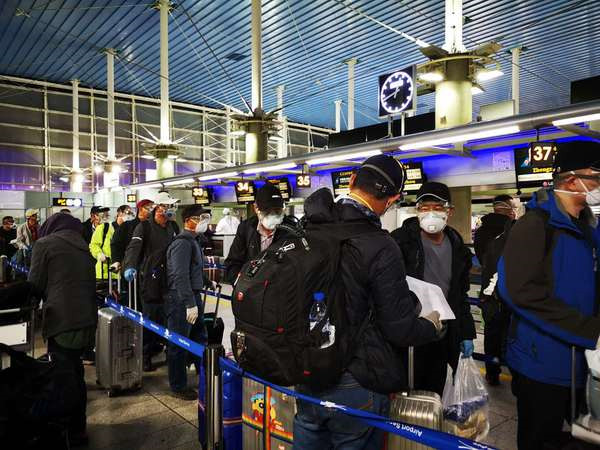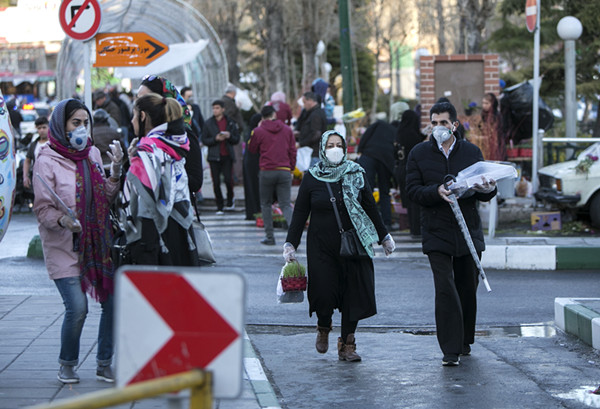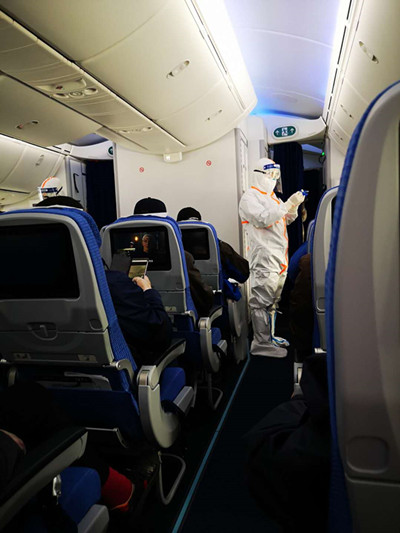Returning to China from Iran amid the COVID-19 outbreak
- By Zhang Liying
 0 Comment(s)
0 Comment(s) Print
Print E-mail China.org.cn, April 1, 2020
E-mail China.org.cn, April 1, 2020
Ladan (Persian name) works for a state-owned enterprise in Tehran, the capital of Iran. She returned to China by chartered flight in early March as the COVID-19 pandemic took hold in the country where she has been living and working for seven years.

Iran first reported two confirmed cases of COVID-19 infection on Feb. 19, and quickly became one of the hardest-hit countries around the world. Iran's Ministry of Health and Medical Education on Sunday reported the total number of 38,309 cases of the novel coronavirus in the country, of whom 2,640 have died.
In the eyes of Ladan, Iran is a responsible Middle Eastern country, with friendly people and pleasant climate
"Although ordinary Iranian households aren't very well-off economically because of the sanctions, they still greatly value quality of life," Ladan explained. "If you visit an Iranian family's home, you'll find nice furniture, lush houseplants and delicate tableware."
Ladan told China.org.cn that after returning to Tehran from her Spring Festival holiday in mid-February, the local government had yet to impose strict inspections or quarantine measures on arrivals. "We only had our temperatures checked and registered our addresses at the airport. There were no mandatory quarantine rules."
"But Chinese enterprises in Tehran generally acted in a responsible manner and required their staff to self-isolate upon arrival," Ladan added.

She explained that during the first few weeks of the outbreak, few people were wearing face masks on the streets of Tehran. "When advised to take preventive measures, some of my Iranian friends said that they'd be fine since they're healthy and don't smoke."
As the situation deteriorated in Iran, multiple measures were introduced to contain the spread of the coronavirus. Ladan said the approaches adopted by Iran to fight the outbreak were similar to those in China. "The measures included closing public places, launching citywide sanitation campaigns, and calling on residents to stay at home whilst avoiding non-essential travel. Checkpoints were set up to check body temperatures. Some sports centers and shopping malls, such as the Iran Mall, which is one of the largest in the Middle East, are also being converted into makeshift hospitals."
"Most Chinese enterprises developed comprehensive emergency plans and introduced closed-off management. The Chinese Embassy in Iran required Chinese enterprises to report the health status of their staff every day," Ladan said. "Canteens purchased ingredients online, and employees bought daily necessities in the same way. Business was conducted mainly by telephone or video conferencing."

Nowruz, or the Iranian New Year, fell on March 20 this year. Iranians usually take a two-week holiday to celebrate what is biggest holiday of the year in the country, marking the transition from winter to spring.
"Except for haft-sin (or haft-seen, a table setting with seven symbolic items whose names start with the letter " س" (pronounced "seen"), many of the customs for Nowruz are similar to those during the Spring Festival in China – travelling or visiting family and friends,” Ladan explained.
"I've spent six Nowruz holidays in Iran. My Iranian friends are very hospitable and always invited us Chinese to join their celebrations at home," Ladan said. "I'm not in Iran for this year's Nowruz, but I learned from the news that many Iranians still chose to travel during the holiday despite the impact of the pandemic."
However, Ladan said that among the replies she received from the holiday wishes she sent, many have been related to the pandemic. "For example, some of my Iranian friends showed confidence in China and Iran in overcoming the challenge, or expressed gratitude for China's assistance to their country."
As for her journey back to China via chartered flight, Ladan said stringent measures were implemented during the entire process. "All passengers had to receive quarantine inspection before boarding. We were also required to wear masks during the entire flight, and tried to avoid eating, drinking and even going to the bathroom."
"Another quarantine inspection was conducted after the plane landed. Passengers displaying any symptoms were then sent to hospital for further tests. The others were taken directly to designated facilities for collective quarantine," Ladan added. "All the passengers on my flight have now finished the compulsory 14 days of isolation, with no confirmed cases of COVID-19."
"Although I've returned to China, I'll keep a close eye on the situation in Iran. I hope the pandemic will be brought under control as soon as possible so that I can return and continue my work."






Go to Forum >>0 Comment(s)